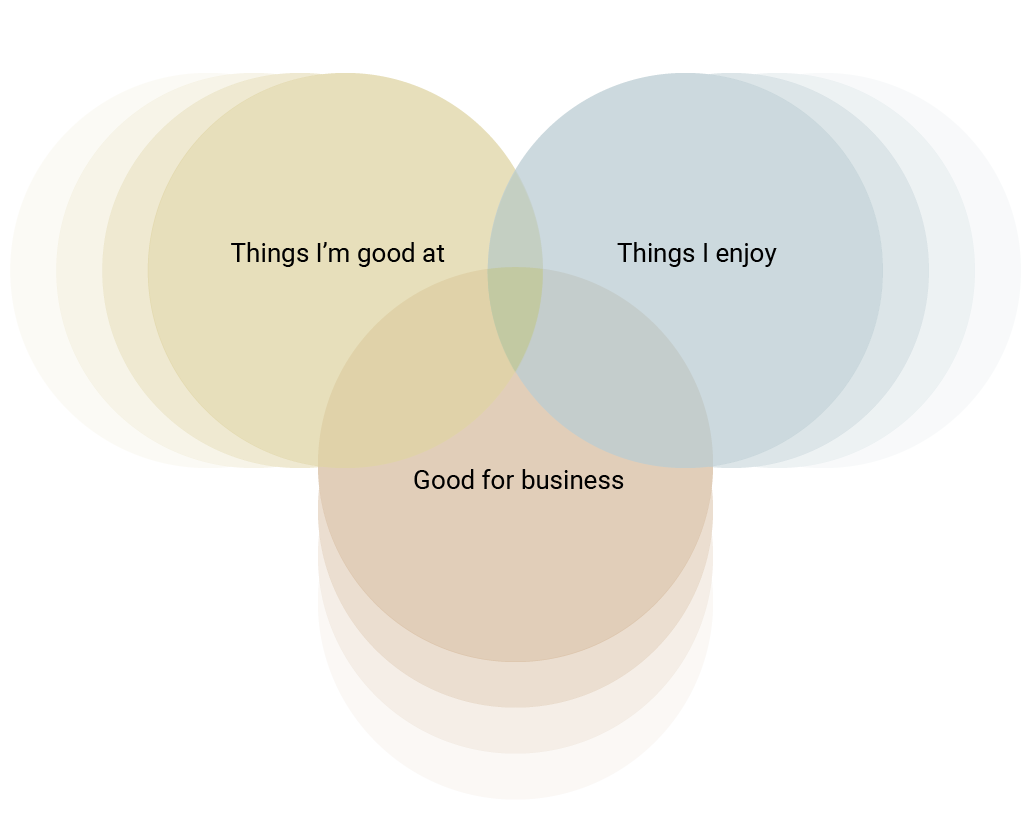There’s a good chance you became an entrepreneur because you were especially good at (and loved doing) something. There’s also a good chance that instead of doing that thing you love to do, you’re bogged down in other responsibilities. After all, you’re the boss, and the boss must worry about everything.
Some people truly enjoy dealing with HR, financial, and administrative tasks. But others find those responsibilities keep them away from doing what fires them up.
The sweet spot is the intersection of what we are great at, what we really enjoy, and what adds significant value to the business. The bigger that intersection, and the more time we spend there, the happier we are likely to be, and the healthier our business is likely to be. What’s more, we will be closer to achieving what we want as entrepreneurs, for both our business and the rest of our life.

Sometimes, the right thing to do is say no
The owner of an innovative boat maker I work with spent years as CEO, consumed by day-to-day operations in two countries. But as someone who excelled in competitive water sports for years, his brilliance is in understanding high performance watercraft. He has a keen eye, and knows how design details can frustrate or delight boaters. He craved spending more time on the water, and working with prototype makers — his sweet spot, and he knew it.
It took several years for him to recognize that promoting the head of operations into the CEO role was the right thing for him and the company. And while he still meets with the CEO regularly, and participates in planning sessions with the management team, he’s not the one dealing with finance and people management. Now, his designs make his company stand out in a very crowded market, and are the source of new revenue streams.
 Another client is the founder and CEO of a consulting firm that helps organizations create thriving, purpose-driven workplaces. He is a visionary leader. His sweet spot is being his company’s ambassador, giving speeches, and meeting with CEOs and other executives of large companies.
Another client is the founder and CEO of a consulting firm that helps organizations create thriving, purpose-driven workplaces. He is a visionary leader. His sweet spot is being his company’s ambassador, giving speeches, and meeting with CEOs and other executives of large companies.
But it wasn’t always this way. For years, he ran the day-to-day operations of a growing business. And frankly, the company’s operations suffered because he was overseeing things that he wasn’t that good at doing, and didn’t enjoy.
He eventually promoted one of his best consultants, who is very good at managing details, to the position of COO. Since then, the CEO has been able to devote himself to speaking and selling. Now he’s working in his sweet spot most of the time.
Finding your sweet spot
Some people just know, but others aren’t sure. Let’s consider each aspect.
Doing what you’re great at
We tend to be drawn to what we do well, or at least like doing. But often people aren’t sure what they are best at. It’s counterintuitive. Other people see our brilliance more clearly than ourselves because they have some distance; whereas, we just do it. So, getting clear about what we are truly great at may require the input of our colleagues, our advisors, our family, our friends.
Doing what you love
This one is usually easy, because we know what we like, what we would do for free, what we stay up late, or get up early to do. Call it passion, call it compulsion, but these activities draw us in. We’re happy when we are doing them.
Doing what adds significant value
For entrepreneurs, adding value ultimately means doing whatever leads to higher revenue and profit. That may be coming up with a killer boat design that takes the industry by storm. Or it may be providing a compelling vision, and inspiring and motivating the organization through our personality. Adding value boils down to driving business success. For social entrepreneurs, it means delivering on your organization’s purpose, having the impact in the world that is your reason for being.
It’s crucial to create the space you need to do your best work.
Doing what you love is the best thing for your business
There is a significant connection between a person’s entrepreneurial sweet spot, what gives them meaning, and their personal purpose. Thanks to making the shift in his responsibilities, the owner of the boat company was able to focus on his passion and his family.
A conversation I often have with CEOs is that they are so busy, it’s hard to find time to think about this important concept. And even when they figure it out, implementing change is difficult and time consuming. That’s true. It’s also true that this is the biggest opportunity you have in your business.
It’s crucial to create the space you need to do your best work. That starts with clarity about where that best work is, and it continues by strategizing the changes needed, so that you can spend more time there. For the boat maker, it was deciding that the opportunity of promoting his operations lead to CEO was greater than continuing in a position he wasn’t suited for, that was preventing him from achieving more success in his business, which has translated into much more satisfaction in the rest of his life.
What’s good for you is also good for your people
The sweet spot concept is important not only for us, but for our teams. If our people are doing their best work, they are most likely to be engaged, fulfilled, and productive. They are more likely to feel their work and personal lives are in harmony. And they are more likely to be resilient in times of change and stress. Imagine if most of your people were working in their sweet spots most of the time. It’s the most effective way to boost employee engagement and create a culture anyone would want to work in.
What’s good for your people is especially important for you. Being an entrepreneur is more like running a marathon than a sprint. To keep up the pace, you need to take care of yourself, do what you love, and do matters to you.
The way forward starts with clarity about what your superpower is, then identifying where you need to bring in talented people whose skills fill the gaps working in their own zones. Prioritize getting into your own sweet spot, and then surround yourself with people who are in theirs.